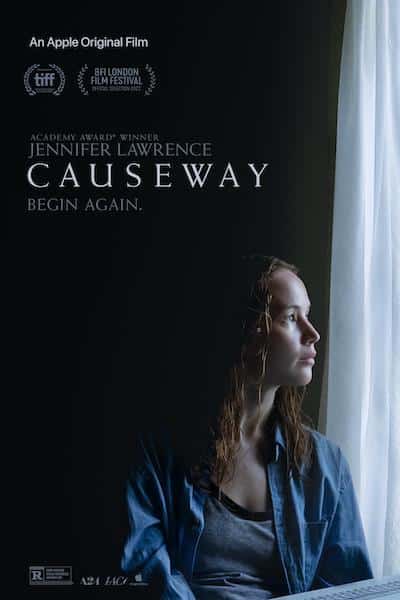‘Causeway’ | Movie Review

A trend in indie cinema these days seems to be sparse dialogue, pregnant pauses, and contemplative facial expressions. Intensity. Deep meaning. Symbolism.
“Causeway” checks all the boxes. However, it offers so much more.
Led by acting heavyweights Jennifer Lawrence and Brian Tyree Henry, Causeway tells the story of Lynsey (Lawrence), a soldier sent home from Afghanistan due to an IED attack. The attack has left Lynsey with a traumatic brain injury and we see her struggle through rehabilitation, helped by a home care nurse played by the wonderful Jayne Houdyshell (“Only Murders In The Building”).
Houdyshell provides calming, solid support as her patient heals, yet we are constantly reminded of how alone Lynsey is. We see her sitting in a wheelchair, trying to sleep, or simply staring out the window, all alone. Much of those scenes have almost no dialogue. Even when Lynsey progresses to driving a car again or being able to go for a morning jog, we still see more of the box checkers mentioned above than conversation.
After rehabilitation, Lynsey returns to New Orleans to her estranged mother, played by the lovely Linda Emond. Lynsey sits alone in the shabby house she grew up in, going through the motions of being cordial and pleasant (but not affectionate) with her mother, finding a part time job, and basically biding her time.
Only when she checks in with her doctor do we see a more animated and chatty Lynsey. You see, she wants to return to active service in the military. If she can go back, she does not have to face the many struggles she now finds herself dealing with. She is determined to convince her skeptical doctor of this.
She finds a kindred spirit in mechanic James (Henry), who fixes her old truck and recognizes her damaged soul; mainly because he himself is a survivor of past traumas.
Kudos to screenwriters Elizabeth Sanders, Ottessa Moshfegh and Luke Goebel and director Lila Neugebauer who collaborate wonderfully to create a foundation of deep and powerful meaning alongside the minimalistic dialogue I have mentioned too much.
Lawerence shows us once again why indie films are her wheelhouse. She is exquisite, able to bring across the repressed sadness, the determination and the anguish that plagues Lynsey with facial expression and body language and few words. Her depth as an actress is as evident as ever.
Henry is subtle and at times, charismatic and humorous. He gives a performance that is multi-faceted, yet does so with quiet respect and nuances.
Lawrence and Henry are acting geniuses who can peel back layers of their characters, compliment one another, and collaborate much like the writing/directing team. Their chemistry is awesome.
I love seeing Houdyshell in just about anything – even in a role such as this in which she is given little to do. The always wonderful Stephen McKinley Henderson as Lynsey’s no-nonsense yet kind physician, gives us a dependable character, much like Houdyshell’s dutiful nurse.
There’s also an important and heart-breaking scene between Lynsey and her incarcerated brother, played by the fantastic deaf actor Russell Harvard.
Perhaps my favorite in the supporting cast, Emonds brings across a hardened beauty and a complex character even with her short time on the screen. With her performance, we see a mother who wishes she’d made better choices and wishes she had a connection with her children.
And that’s what this picture is really all about. Connection. Lack of connection. Damaged folks trying to make a connection, maintain a connection, or even begin to learn how to connect. It’s not a feel-good movie, but it offers hope and shows us how healing is possible.
My grade: A. Go see it.
“Causeway” opens in theaters Friday, Nov. 4, and streams on Apple TV+ as well. The movies is rated R for language, sexual references and drug use. Running time is 92 minutes.





